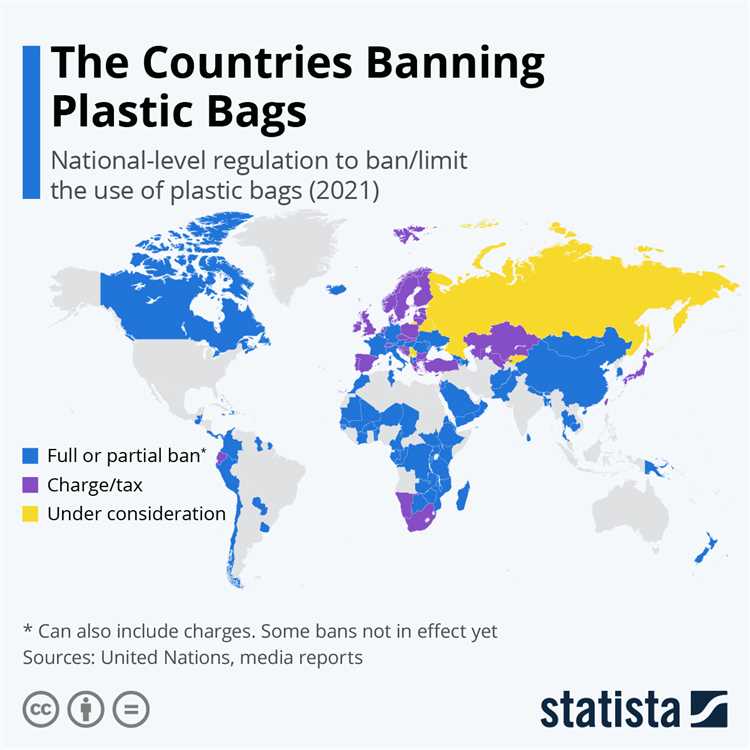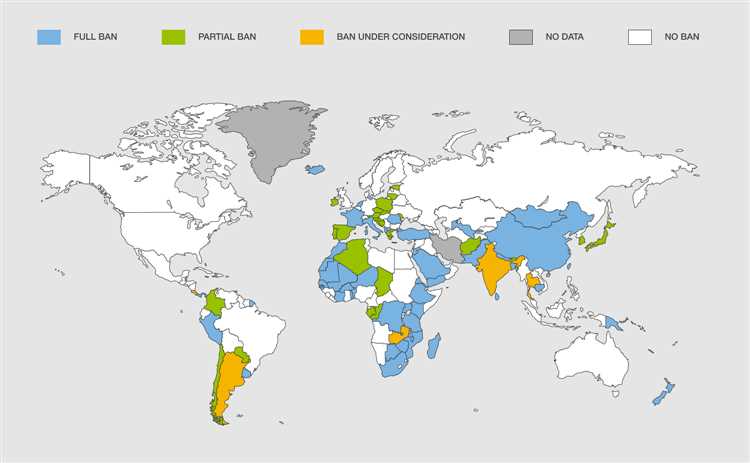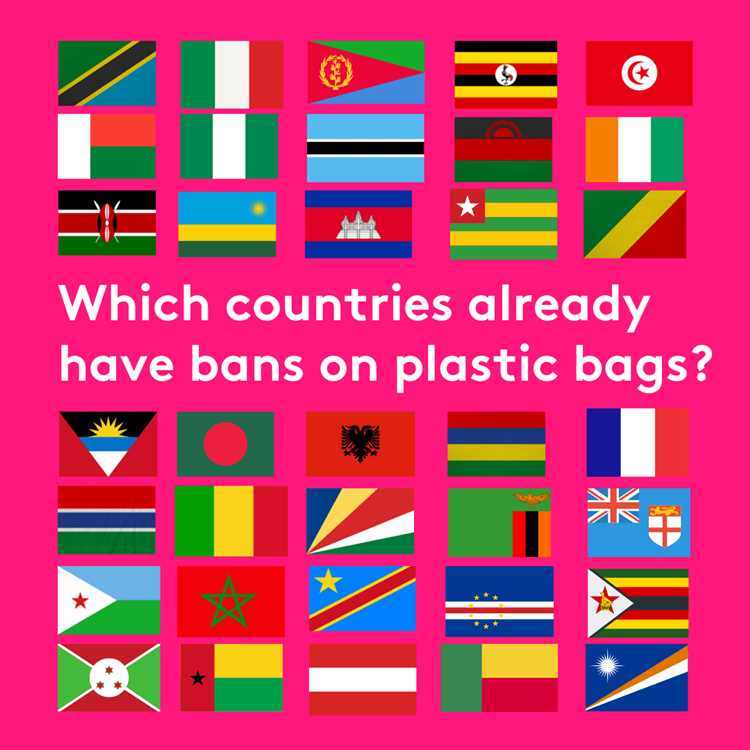
Russia, the world’s largest country by land area, may soon join a growing list of nations that have banned single-use plastic bags. The country is considering implementing restrictions on plastic bags in an effort to reduce pollution and protect the environment.
If the proposed legislation is passed, Russia would become one of the latest countries to take a stand against plastic waste, following in the footsteps of countries such as France, Italy, and China. These countries have already implemented bans on single-use plastic bags, which have been proven to have a devastating impact on the environment.
The move comes as part of a wider global trend towards reducing plastic waste and promoting sustainable alternatives. Plastic bags are a major contributor to pollution and can take hundreds of years to decompose, causing significant harm to wildlife and ecosystems in the meantime.
Russia’s potential ban on plastic bags is seen as a positive step towards protecting the environment and encouraging the use of reusable alternatives. This could include promoting the use of cloth bags, paper bags, or encouraging shoppers to bring their own reusable bags when shopping.
While the ban is still under consideration, the potential impact of such legislation cannot be underestimated. With Russia’s vast land area and large population, a ban on plastic bags could have a significant positive effect on reducing plastic waste and protecting the environment for future generations.
- Russia’s Move Towards Sustainable Practices
- The Global Plastic Bag Problem
- Effects on the Environment
- Possible Solutions
- Russia’s Plastic Bag Use and Environmental Impact
- The Government’s Response
- The Future of Plastic Bag Use in Russia
- Legislation to Address Plastic Bag Pollution
- Benefits of Banning Plastic Bags
- Challenges and Opposition to the Ban
- Russia’s Position in the Global Effort to Reduce Plastic Waste
- Question-Answer:
- Is it true that Russia has banned plastic bags?
- When did Russia introduce the ban on plastic bags?
- Why did Russia decide to ban plastic bags?
- What types of plastic bags are included in the ban?
- What are some alternatives to plastic bags in Russia?
- Why is Russia banning plastic bags?
Russia’s Move Towards Sustainable Practices
Russia has recently taken steps towards promoting sustainable practices in order to address the pressing issue of plastic pollution. One such step has been the potential ban on plastic bags, joining the global movement to reduce plastic waste.
In an effort to tackle environmental concerns, Russia is considering implementing legislation that would restrict the production, sale, and use of plastic bags. This move comes as countries around the world recognize the detrimental impact of plastic bags on the environment, particularly on marine ecosystems.
The proposed ban reflects a growing awareness among Russians about the need to reduce plastic waste and promote more sustainable alternatives. Despite the convenience of plastic bags, which are lightweight and easily disposable, their negative impact on the environment cannot be overlooked.
By banning plastic bags, Russia aims to encourage the use of reusable bags made from sustainable materials, such as cotton or jute. These alternatives are not only more durable and long-lasting, but they also reduce the demand for single-use plastics, helping to protect the environment for future generations.
| Benefits of banning plastic bags in Russia: |
|---|
| 1. Reduces plastic waste and pollution |
| 2. Protects marine ecosystems and wildlife |
| 3. Promotes the use of sustainable materials |
| 4. Encourages the adoption of eco-friendly practices |
While the potential ban on plastic bags is a positive step towards sustainability, it is just the beginning. Russia needs to continue its efforts to reduce plastic use in other areas, such as packaging and single-use plastic items. By implementing comprehensive policies and promoting public awareness, Russia can play a significant role in addressing the global plastic pollution crisis.
With the world becoming more conscious of the need to protect the environment, Russia’s move towards sustainable practices showcases its commitment to playing a leading role in the fight against plastic pollution. By taking such measures, Russia not only demonstrates its environmental responsibility but also serves as an example for other countries to follow.
The Global Plastic Bag Problem
Plastic bags have become a global environmental issue due to their harmful impact on the environment, wildlife, and human health. These single-use bags are made from petroleum-based plastics that do not biodegrade, leading to long-lasting pollution. The production and disposal of plastic bags also contribute to greenhouse gas emissions, deforestation, and depletion of natural resources.
The plastic bag problem is particularly acute in coastal and marine areas, where discarded bags pose a significant threat to marine life. Marine animals such as seabirds, turtles, and whales often mistake plastic bags for food and consume them, resulting in injury or death. Plastic bags also entangle marine animals, leading to further harm and death.
Effects on the Environment
Plastic bags have a severe impact on land and water ecosystems. When plastic bags are not properly disposed of, they end up in landfills or escape into the environment, polluting rivers, oceans, and forests. The littering of plastic bags also damages ecosystems and disrupts the natural balance of flora and fauna. Moreover, plastic bags break down into small microplastics over time, which can contaminate the soil and water, endangering plants, animals, and humans.
In addition to their environmental impact, plastic bags contribute to climate change. The production of plastic bags requires the extraction of fossil fuels and the energy-intensive manufacturing processes. This leads to the release of greenhouse gases, such as carbon dioxide, into the atmosphere, exacerbating global warming and climate change.
Possible Solutions

To address the global plastic bag problem, many countries have implemented measures such as bans, taxes, and regulations on plastic bags. Some countries have successfully reduced their plastic bag consumption by promoting reusable bags and encouraging the use of alternative materials.
Individuals can also contribute to solving the plastic bag problem by practicing sustainable shopping habits. This includes using reusable bags, refusing plastic bags when unnecessary, and recycling plastic bags properly.
Efforts are also being made to develop and promote biodegradable and compostable bags as alternatives to plastic bags. These bags are designed to break down naturally over time, reducing their environmental impact.
In conclusion, the global plastic bag problem requires urgent attention and action to protect our environment and wildlife. By implementing sustainable practices and supporting alternative solutions, we can move towards a future with fewer plastic bags and a healthier planet.
Russia’s Plastic Bag Use and Environmental Impact

Plastic bag usage in Russia has become a significant concern for the environment in recent years. With a population of over 140 million, the country generates a substantial amount of waste, and plastic bags contribute to this growing problem.
According to research, the average Russian citizen uses approximately 270 plastic bags per year. This excessive consumption has resulted in an enormous number of plastic bags ending up in landfills, rivers, and forests, causing serious environmental damage.
The environmental impact of plastic bags is vast. Firstly, plastic bags are made from non-renewable resources, such as crude oil, which contributes to further environmental degradation. Additionally, plastic bags do not biodegrade but instead break down into smaller microplastics, which can contaminate soil, water sources, and harm wildlife.
The Government’s Response
In an effort to combat the plastic bag crisis, the Russian government has taken some measures. Firstly, in 2019, the government introduced a law that imposed a fee on plastic bags in large retail stores. This fee aimed to discourage the use of plastic bags and encourage consumers to bring their own reusable bags.
Furthermore, there have been discussions about a potential ban on plastic bags in the future. Several regions in Russia, such as Moscow and St. Petersburg, have already implemented local bans on plastic bags, limiting their use and promoting alternative eco-friendly options.
The Future of Plastic Bag Use in Russia

As the environmental awareness in Russia continues to grow, it is likely that the country will see further regulation and restrictions on plastic bag usage. The government’s efforts, along with the initiatives of environmentally-conscious individuals and organizations, will contribute to reducing plastic bag consumption and protecting the environment for future generations.
| Environmental Impact of Plastic Bags |
|---|
| Contributes to waste and pollution |
| Uses non-renewable resources |
| Does not biodegrade |
| Contaminates soil and water sources |
| Harms wildlife |
Legislation to Address Plastic Bag Pollution
As plastic bag pollution continues to be a significant environmental concern, many countries around the world are taking action to reduce their usage and minimize the negative impact on the planet. Russia is the latest country to join the movement, with recent legislation aimed at banning or significantly reducing the use of plastic bags.
The new legislation in Russia is a response to the alarming amount of plastic waste that is generated each year. Plastic bags are not biodegradable and can take hundreds of years to break down, leading to long-term damage to ecosystems and wildlife. By implementing a ban on plastic bags, Russia aims to reduce pollution and encourage the adoption of more sustainable alternatives.
Under the new legislation, retailers will be prohibited from providing plastic bags to customers free of charge. Instead, they will have to offer alternative options such as reusable bags or paper bags, which are considered to be more environmentally friendly. The hope is that this will prompt consumers to change their habits and opt for more sustainable choices when it comes to carrying their purchases.
While the ban on plastic bags is a significant step in the right direction, there are still challenges to overcome. One concern is the potential increase in the use of other single-use plastics as a substitute for plastic bags. To address this issue, the legislation also includes measures to encourage the development and use of biodegradable and compostable alternatives.
The legislation in Russia is part of a broader global movement to tackle plastic pollution. Many countries, including France, Italy, and Australia, have already implemented similar bans or restrictions on plastic bags. These measures have proven to be effective in reducing plastic waste and raising awareness about the need for more sustainable practices.
Overall, the legislation in Russia represents a positive step towards addressing plastic bag pollution. By limiting the availability of plastic bags and promoting more environmentally friendly alternatives, the country is working towards a cleaner and healthier future.
Benefits of Banning Plastic Bags

Banning plastic bags can have several positive effects on both the environment and human health. Here are some benefits of implementing such a ban:
1. Reducing plastic waste: Plastic bags are a major contributor to the global plastic waste crisis. By banning plastic bags, countries can significantly reduce the amount of plastic waste that ends up in landfills and pollutes the environment.
2. Protecting wildlife: Plastic bags often end up in natural habitats, posing a threat to wildlife. Animals can mistake them for food, leading to ingestion and suffocation. By eliminating plastic bags, we can help protect marine life and prevent harm to terrestrial animals.
3. Lowering carbon emissions: The production of plastic bags requires the extraction and processing of fossil fuels, which contributes to greenhouse gas emissions. By banning plastic bags, we can decrease the demand for plastic production and subsequently reduce carbon emissions.
4. Promoting reusable alternatives: Banning plastic bags encourages the use of reusable bags, such as cloth or canvas bags. Reusable bags are more durable and can be used multiple times, helping to minimize waste and resource consumption.
5. Saving energy and resources: The production of plastic bags requires significant amounts of energy and resources, including water and oil. By banning plastic bags, we can reduce the consumption of these valuable resources and promote more sustainable practices.
6. Improving aesthetics: Plastic bags are often found littered in streets, parks, and water bodies, creating an eyesore and negatively impacting the overall aesthetics of an area. By banning plastic bags, we can create cleaner and more visually appealing environments.
These are just a few of the many benefits that come from banning plastic bags. By implementing such a ban, countries can take a significant step towards a more sustainable and environmentally-friendly future.
Challenges and Opposition to the Ban
While the ban on plastic bags in Russia is seen as a positive step towards reducing plastic pollution, it has faced several challenges and opposition.
One challenge is the lack of viable alternatives to plastic bags. Many argue that the available alternatives, such as paper bags or biodegradable bags, are not as durable or convenient as plastic bags. This can lead to concerns over the practicality of the ban, especially for industries that heavily rely on plastic bags for packaging and transportation.
Opponents also argue that banning plastic bags could result in job losses in the plastic bag manufacturing industry. This can create economic challenges, especially in regions where plastic bag production is a significant part of the local economy.
Another challenge is the need for public awareness and behavior change. The success of the ban largely depends on the willingness of consumers to adopt alternative options and reduce their reliance on plastic bags. Education campaigns and incentives may be needed to encourage consumers to make the switch.
Furthermore, enforcement of the ban can be a challenge. Without proper monitoring and penalties for non-compliance, some businesses may continue to distribute plastic bags illegally. This highlights the need for effective enforcement strategies to ensure the ban is followed and the intended environmental benefits are realized.
In addition, there is opposition from certain industries and interest groups who believe that the ban on plastic bags is unnecessary or ineffective in addressing the larger issue of plastic pollution. They argue that other measures, such as improved waste management systems or increased recycling efforts, would be more impactful in reducing plastic waste and its environmental impact.
Overall, the ban on plastic bags in Russia may face various challenges and opposition. However, with proper planning, education, and enforcement, it has the potential to significantly contribute to reducing plastic pollution and promoting sustainable practices.
Russia’s Position in the Global Effort to Reduce Plastic Waste
Russia has emerged as one of the latest countries to take action in the global effort to reduce plastic waste. The country has recognized the environmental and health hazards posed by plastic pollution and has implemented measures to address the issue.
One of the key steps taken by Russia is the ban on single-use plastic bags. The ban, which came into effect on January 1, 2020, prohibits the production, sale, and distribution of plastic bags less than 50 microns thick. This move is expected to significantly reduce the consumption of plastic bags in the country and promote the use of alternative eco-friendly options.
In addition to the ban on plastic bags, Russia has also implemented a number of other measures to tackle plastic waste. The government has introduced waste sorting programs and increased recycling infrastructure to encourage proper waste management practices. Efforts are being made to improve public awareness about the importance of reducing plastic waste and promoting sustainable alternatives.
Furthermore, Russia is actively participating in international initiatives and agreements aimed at reducing plastic pollution. The country is a signatory to the Basel Convention, an international treaty that regulates the transboundary movement of hazardous waste, including plastic waste. Russia also actively collaborates with other countries and organizations to share knowledge, best practices, and technologies for reducing plastic waste.
While Russia’s efforts to reduce plastic waste are commendable, there is still more work to be done. The country faces challenges such as limited recycling facilities and the need for further infrastructure development. However, with its commitment to tackling the issue, Russia is making significant progress in joining the global fight against plastic pollution.
Question-Answer:
Is it true that Russia has banned plastic bags?
Yes, it is true. Russia has recently implemented a ban on lightweight plastic bags in an effort to reduce plastic waste and protect the environment.
When did Russia introduce the ban on plastic bags?
Russia introduced the ban on plastic bags on June 1, 2020.
Why did Russia decide to ban plastic bags?
Russia decided to ban plastic bags in order to combat the growing issue of plastic pollution and protect the environment. By reducing the use of plastic bags, Russia aims to decrease plastic waste and encourage the use of more sustainable alternatives.
What types of plastic bags are included in the ban?
The ban on plastic bags in Russia applies to lightweight bags that are less than 50 microns thick, which are commonly used in grocery stores and retail outlets.
What are some alternatives to plastic bags in Russia?
Some alternatives to plastic bags that can be used in Russia include reusable cloth bags, paper bags, and biodegradable bags made from materials such as cornstarch. These alternatives are more environmentally friendly and can help reduce plastic waste.
Why is Russia banning plastic bags?
Russia is banning plastic bags in order to reduce plastic waste and protect the environment. Plastic bags take a long time to decompose and can cause harm to wildlife and ecosystems.